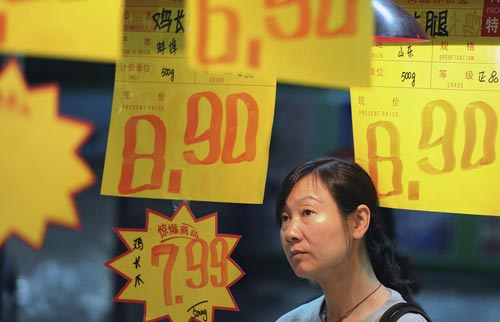Society
- Details
- By David Cao
- Hits: 955
China's consumer price index (CPI), a main gauge of inflation, rose 5.3 percent in April from a year ago, the National Bureau of Statistics (NBS) said on Wednesday.

A customer looks at price tags in a supermarket in Hefei, Anhui province May 11, 2011. China's headline consumer price inflation slowed to 5.3 percent in the year to April from 5.4 percent in March, the National Bureau of Statistics (NBS) said on May 11, 2011.
The April figure was down 0.1 percentage points from March's 32-month high of 5.4 percent, according to the NBS.
- Details
- By David Cao
- Hits: 933
According to Beijing Daily, the Forbidden City has been robbed and 7 Hong Kong private collections lost early on 8th May 2011.

Armed Policed stand behind security line on 10th May 2011.
Read more: Forbidden City Been Robbed, Private Collections Lost 2011
- Details
- By David Cao
- Hits: 860

Tornado attacks Foshan, Guangzhou Province 7th May, 2011.
Natural disasters in China left 34 people dead and caused 5.11 billion yuan (US$786 million) in direct economic losses in April of this year, the Ministry of Civil Affairs said in a Monday report.
Hailstorms proved to be the month's most deadly natural phenomenon, with 18 people killed in south China's Guangdong Province after hailstorms and strong winds rocked the region.
Other areas were damaged by droughts, floods, earthquakes, sleet, landslides, forest fires and pests, according to the report. However, the degree of damage done was not as serious as in past years, the report said.
Read more: Natural disasters leave 34 dead in China in April 2011
- Details
- By David Cao
- Hits: 1280

Thousands of talcum-powder-feed Chick have been verified in Chongqing.
Tainted melamine milk powder, salted duck eggs containing cancer-causing dyes, artificial honey, fake wine, donkey-hide gelatin, waste oil, sulfur steamed ginseng, plaster tofu, dyed bread…the list goes on.
Sadly, many people estimate that the list will get longer. Every day we worry about the next food time bomb exploding, we just do not know where the site of the blast will be.
In the past, my impression of Chinese enterprises was in copyright fraud, counterfeit brands, later spreading to other areas like toxic toys. The food industry now faces its own serious problem.
- Details
- By David Cao
- Hits: 825
At least 31 residents in an east China county have been found to have elevated levels of lead in their blood after the metal was improperly disposed of by a local battery plant, officials said Monday.
Investigators from the environmental protection authority of eastern Zhejiang Province concluded that the lead poisoning incident in Deqing County was caused by Zhejiang Haijiu Battery Co., Ltd.'s "illegal disposal of industrial waste" and lax supervision by a local environment watchdog.
Three-hundred and seventeen villagers have taken blood tests in Deqing so far, according to a spokesman from the county government. Thirty-one of the villagers, including 11 children, were found to have excessive amounts of lead in their blood, and others are still awaiting their test results, the spokesman said.
More Articles …
Page 95 of 255